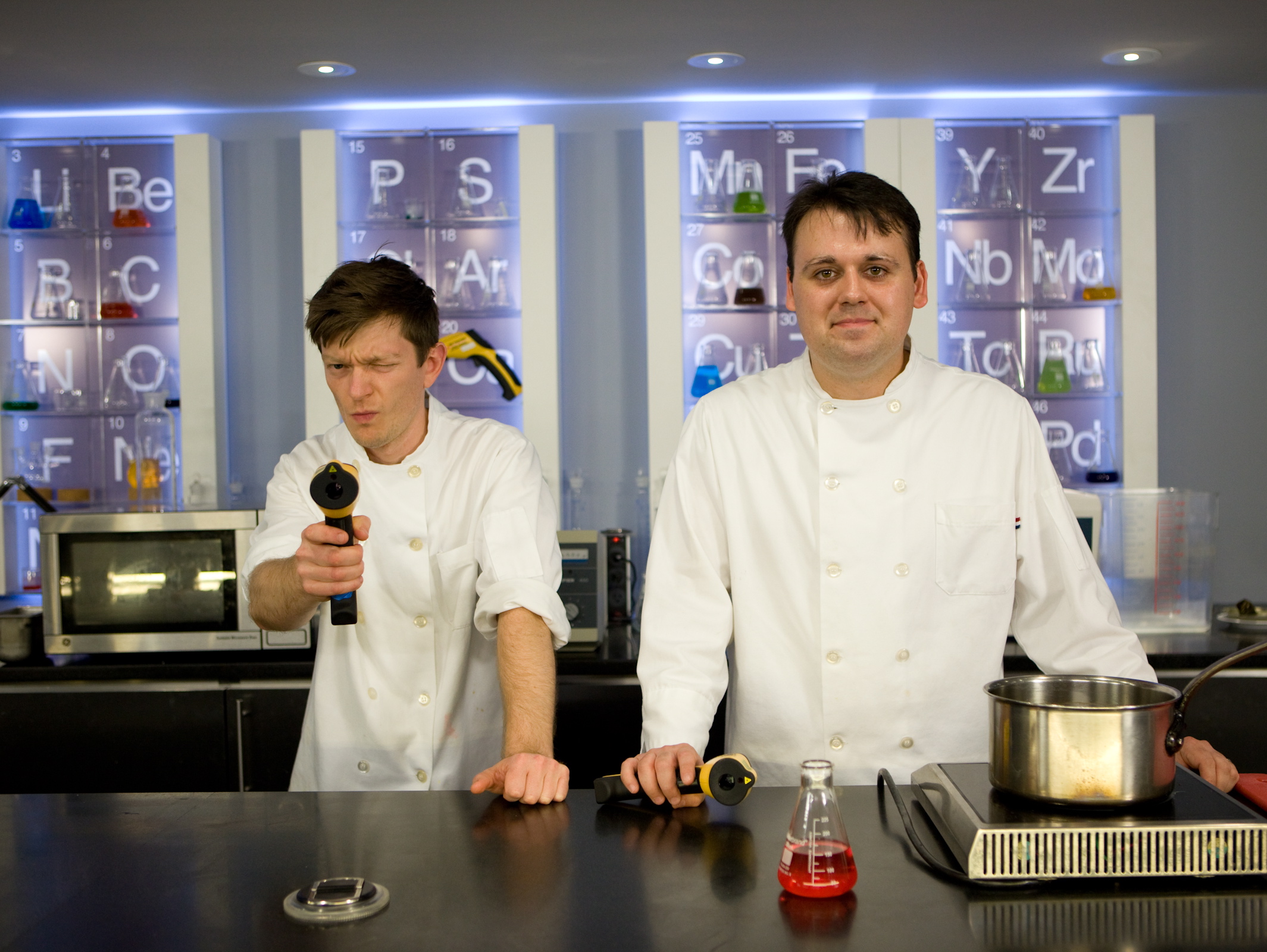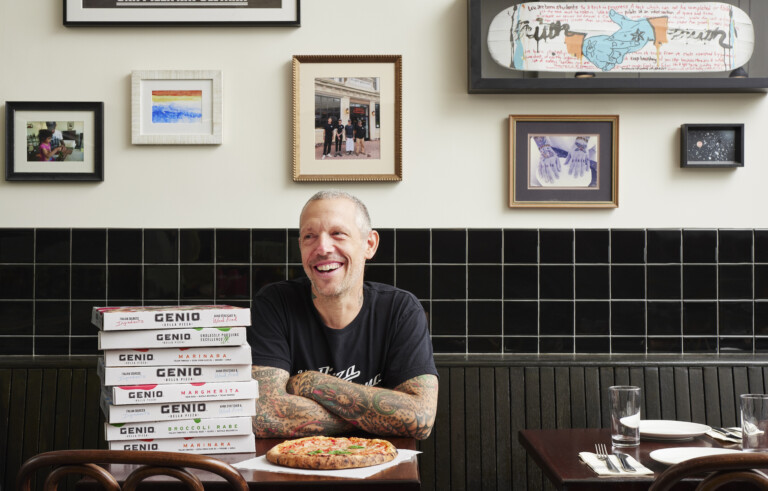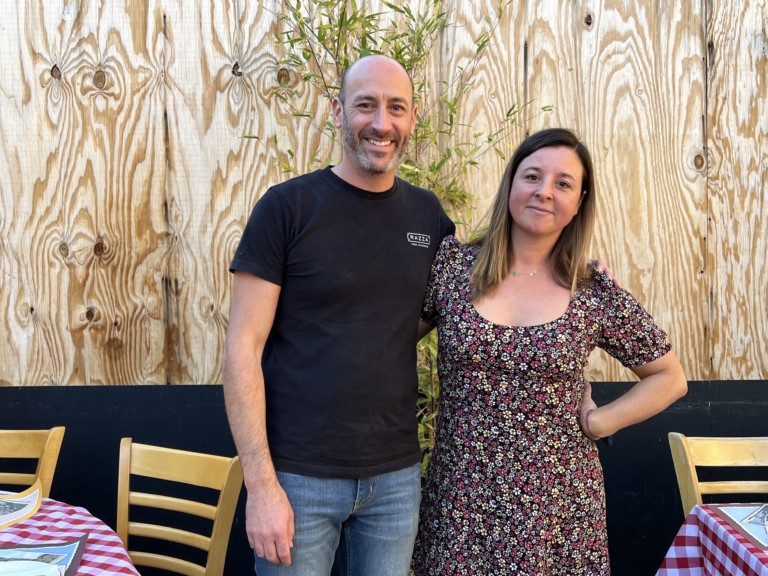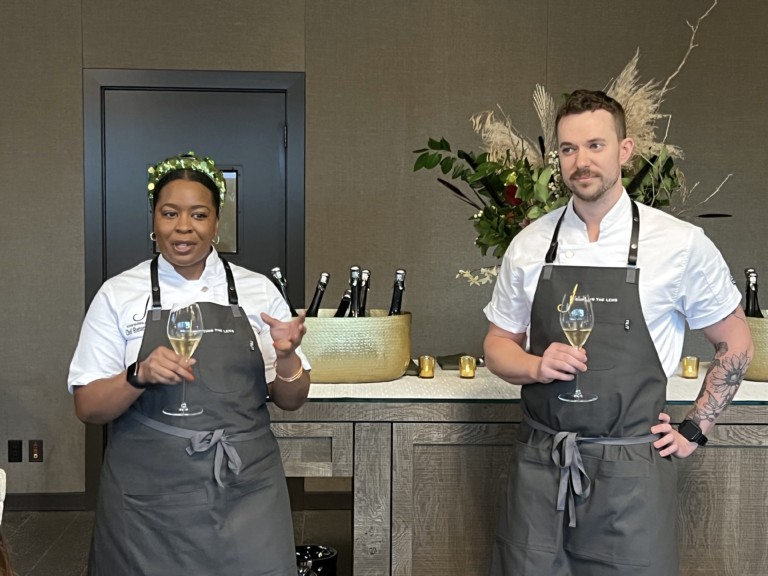In a new series that the Planet Green network touts as “MythBusters” meets “Willy Wonka,” experimental Chicago-based chefs Homaro Cantu and Ben Roche of Moto demonstrate their culinary wizardry on a weekly basis in their series “Future Food,” which debuts on March 30. Whether they’re trying to craft something that looks and tastes like fish, but contains zero fish, or they’re recycling leftover French toast to create a “cheese board,” Cantu insists they’re looking to “use cutting edge science to take our innovative menu to new heights.” Toward that end, Executive Chef Cantu and Executive Pastry Chef Roche frequently meet in Moto’s lab, where they have culinary weapons like liquid nitrogen and ion particle guns at their disposal. Their approach is so cutting-edge, and remaining eco-friendly is so important to them, that they even developed a way to print their menu on edible paper. As Cantu puts it in the second episode of Future Food, “If this is not the most bizarre dining experience you’ve had, I’m not doing my job.”
Josh Lurie: How did the Future Foods opportunity come about?
Roche: Omar and myself have been trying over the past 3-4 years to do something on TV…The stuff we’re doing is so visual, why not present it? We’re both chefs who like to have fun with our food. That passion translates on TV…Over the years, things started to fall together and bam.
JL: How did the two of you start working together?
Roche: Omar had worked at Charlie Trotter’s for four years and I came there right at the very end, as he was leaving. A year a half later, he opened up Moto and I had come in as a diner. It was my time to leave the other restaurant, I kind of showed up and asked for a job.
JL: How do you define the different jobs at Moto?
Roche: Any position at Moto has always been a little bit of everything. My first job was dishwasher, prep cook. Now they normally start in the kitchen, move to different stations and then work the floor.
JL: What do you look for in an employee?
Roche: The hunger. We look for really passionate people who are psyched, have open minds and are very creative. We don’t really look for science backgrounds or a lot of cooking experience. The best thing they can have is an open mind and do everything they can to explore an idea.
JL: Do you use the term molecular gastronomy, or is there another expression for what you do?
Cantu: When we’re talking to the staff, we’re not saying, let’s create molecular gastronomy. We’re just looking for creative ways. That’s what “Future Food” is all about, passionate people doing passionate things.
Roche: A better term to describe our food is from the art world and not the food world: “post modern.” It’s pretty futuristic, different from what other chefs are doing, but it’s also about the experience.
JL: What was your first experiment with post modern food?
Cantu: We just kind of made it up as it went along. One line cook in our first year of opening said. “When I think of molecular gastronomy, I think of atom smashers.” We’re not doing that here. Not every dish has to be a scientific breakthrough…We’re taking off the shelf products and making products that are greener and maybe more flavorful. We’re taking the future and making it happen now. We’re like the super salesmen, like Tommy Boy. If it doesn’t work, we keep plugging away until it’s done right.
JL: What prompted you to create a lab at Moto? Is it a real lab or a set?
Cantu: It is a set, but it’s also a fully functional state of the art lab, and arguably, the most cutting edge culinary lab in the world.
Roche: It used to be an extension of the dining room. It’s in the basement. After a few years of doing private parties, it was time to turn it into a lab. The lab was modeled after a lab that I had been doing in my house for five years…You can actually dine in this lab, and there are chefs there cooking away. We serve dishes out of there. You’re seeing the latest and greatest of high technology in food.
JL: Why is it so important to be green?
Cantu: I invented a polymer oven before the restaurant opened. Pop it in your microwave for 15-20 seconds and it reaches 350-400 degrees. You wouldn’t have to use a gas oven. Going green takes time, perseverance and money. You have to have a sustainable business – Moto…then take it to levels where you’ll see this on store shelves. There’s some drama involved and a lot of comedy, but at the end of the day, it’s green and forward thinking.
JL: Cooking with chemicals seems to run counter to the current movement for minimal manipulation. How do you reconcile that?
Cantu: We like to use technology versus heavy industrial chemicals. Let’s take foam for example. We would opt to use a natural organic way, but we got bored with foams four years ago…We always try to stay away from that if possible. Local, organic and non GMO are the way to go…There are a time and place for those types of products, but not in every dish.
Roche: It also depends on your definition of a chemical…I consider a chemical bug spray and stuff like that…Anything we use like gum or natural hydro cholide, you’re talking about as much chemicals as an egg.
JL: At some point in one of the episodes, you said an ingredient is used in hospitals. How hard is it to find some of these ingredients?
Cantu: Transglutaminase has actually been used in the sausage industry for a very long time…to basically bind the proteins together. You can buy it at Ajinomoto. It’s a Japanese company that developed it. It fuses animal proteins together. You’re talking 1%, if that, by weight. It doesn’t taste like anything.
JL: How dangerous is it to work with liquid nitrogen?
Cantu: I have sent more people to the hospital because of knife wounds and burns. I have not sent one person at the hospital for liquid nitrogen exposure…Just through the sheer fear factor, people are always extremely cautious about it, but it really takes a lot to give you a solid burn.
Roche: If you’re 20 years old and taking a 9th grade English class, you have to work really hard to get an F…Just because of the intrinsic knowledge of danger, people are careful about it…It speeds up the process of innovation.
JL: Would you go to Mitsuwa to test dishes if you weren’t being filmed?
Cantu: The trick here with Future Foods is we have to demonstrate to the audience what we really think…We do have a lot of outside events where we do serve food like that. That’s basically designed to give us a gauge where we’re at with these projects…It’s just designed to grab the viewers’ attention. With the fishy one, we went to a sushi market and failed. We just had to hang our heads in shame and move on. People ended up liking it at the restaurant.
JL: How often do you do staff challenges? Were these created for the show?
Cantu: Whenever we brainstorm new ideas, it is kind of like a challenge. We’re not competing with each other, but we are competing with each other. When you walk into the door at Moto, we don’t care if it’s your first day or your last day, you’re working on a new dish. It’s this competitive edge that keeps us innovative. It’s not just one or two ideas. It takes a team to make a change.









Blog Comments
What is the difference between a Chinese cleaver and a meat cleaver? :The Longtail Music Catalog
March 30, 2010 at 5:22 AM
[…] Food GPS » Moto Chefs Explore “Future Food” on Planet Green […]
MyLastBite
March 29, 2010 at 9:37 AM
Love the term “post modern”, and I’m super excited we have our own sort of”El Bulli Taller” here in the U.S.!!! (link to Adria’s Taller) http://www.starchefs.com/features/travel/eltaller/html/index.shtml